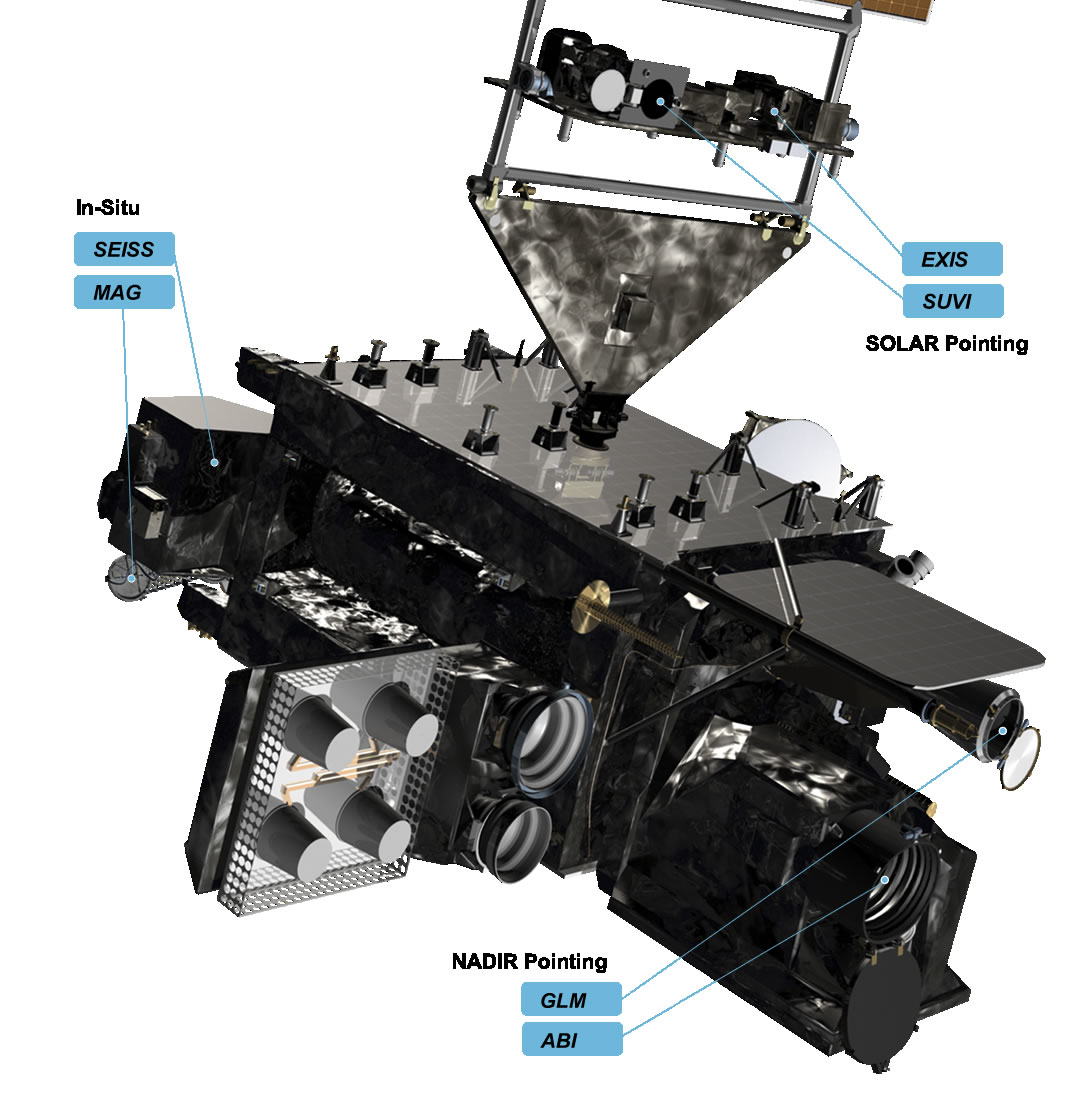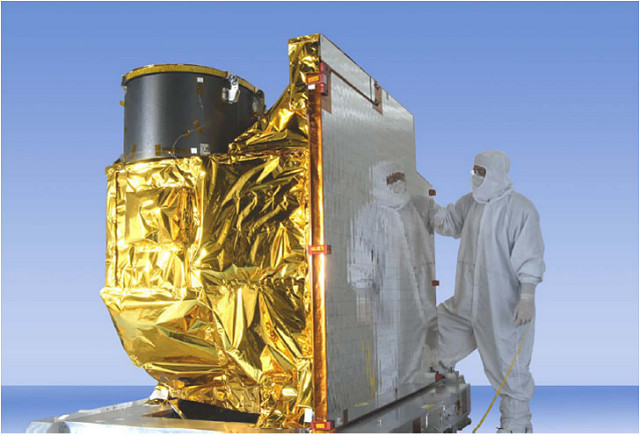NOAA Gives Status Update on GOES-17 Advanced Baseline Imager
Special Stories
25 Jul 2018 10:42 AM
[GOES-R ABI install in Lockheed Martin clean room before launch. From NOAA]
Top officials from NOAA's Satellite and Information Service and National Weather Service spoke Tuesday with media about the status of the GOES-17 Advanced Baseline Imager (ABI), the satellite's primary instrument.
The Advanced Baseline Imager is the primary instrument on the GOES-R Series for imaging Earth’s weather, oceans and environment. ABI views the Earth with 16 different spectral bands (compared to five on the previous generation of GOES), including two visible channels, four near-infrared channels, and ten infrared channels. ABI is a mission critical payload for the GOES-R Series, providing more than 65 percent of all mission data products currently defined. The first ABI imagery was sent back in late May.
 The ABI has experienced technical issues with its cooling system during the orbital check-out phase of GOES-17's six instruments -- the other five are performing normally. The cooling system is a significant part of the ABI and did not start up properly. The first problems with the ABI were reported in the middle of May.
Role of the Advanced Baseline Imager (ABI) Loop Heat Pipe
Loop heat pipes keep the ABI at the correct operating temperatures. The ABI infrared detectors need to be cold to accurately measure the thermal energy radiated from the Earth’s atmosphere. The detectors need to be cooled to varying degrees (some as low as -351°F) based on where they fall on the electromagnetic spectrum to function properly. The ABI has different ways to maintain thermal control. The mechanical cooler pumps heat away from the visible and infrared detectors to cool them to their required temperatures. The heat is transported to an external radiator by the loop heat pipes. The radiator is a large reflective surface designed to reject excess thermal energy to space. The blankets and shields protect the instrument from absorbing too much solar radiation.
The ABI has experienced technical issues with its cooling system during the orbital check-out phase of GOES-17's six instruments -- the other five are performing normally. The cooling system is a significant part of the ABI and did not start up properly. The first problems with the ABI were reported in the middle of May.
Role of the Advanced Baseline Imager (ABI) Loop Heat Pipe
Loop heat pipes keep the ABI at the correct operating temperatures. The ABI infrared detectors need to be cold to accurately measure the thermal energy radiated from the Earth’s atmosphere. The detectors need to be cooled to varying degrees (some as low as -351°F) based on where they fall on the electromagnetic spectrum to function properly. The ABI has different ways to maintain thermal control. The mechanical cooler pumps heat away from the visible and infrared detectors to cool them to their required temperatures. The heat is transported to an external radiator by the loop heat pipes. The radiator is a large reflective surface designed to reject excess thermal energy to space. The blankets and shields protect the instrument from absorbing too much solar radiation.
 Why Loop Heat Pipes are Necessary
The loop heat pipes transfer excess thermal energy to the radiator. If the loop heat pipes are not operating correctly, the cryocooler and other electronics get too warm and have to be turned off to prevent them from being damaged.
Troubleshooting the Issue
Experts are investigating the cause of the issue and pursuing several possible corrective actions. Based on their efforts, the ABI is showing improved performance. The experts are working to improve channel
availability with adjustments in operating procedures, software and algorithm changes. They have also narrowed down the number of possible root causes to a few likely possibilities. A series of ground-based tests is underway to isolate the specific root case. Additionally, design modifications for the GOES-T and GOES-U ABIs are being explored to ensure the cooling system issue is not repeated.
https://www.nesdis.noaa.gov/sites/default/files/GOES-17_ABI_Media_Call_072418.mp3
Click above to hear the audio of the press briefing, which features: Dr. Steve Volz, director of NOAA's Satellite and Information Service, Pam Sullivan, director of the GOES-R System Program and Joe Pica, director of the Office of Observations for NOAA's National Weather Service.
https://www.facebook.com/WeatherNation/videos/10156296250339874/
You can read more about the GOES-17 journey at this link. NASA and NOAA launched the satellite on March 1st as GOES-S, provides many significant upgrades to help meteorologists and forecasters. The imagery and data from the satellite should help to improve forecasts across the western U.S., Alaska, and Hawaii.
https://youtu.be/ORA9BaCcjls
Information from NOAA
Edited for WeatherNation: Meteorologist Mace Michaels
Why Loop Heat Pipes are Necessary
The loop heat pipes transfer excess thermal energy to the radiator. If the loop heat pipes are not operating correctly, the cryocooler and other electronics get too warm and have to be turned off to prevent them from being damaged.
Troubleshooting the Issue
Experts are investigating the cause of the issue and pursuing several possible corrective actions. Based on their efforts, the ABI is showing improved performance. The experts are working to improve channel
availability with adjustments in operating procedures, software and algorithm changes. They have also narrowed down the number of possible root causes to a few likely possibilities. A series of ground-based tests is underway to isolate the specific root case. Additionally, design modifications for the GOES-T and GOES-U ABIs are being explored to ensure the cooling system issue is not repeated.
https://www.nesdis.noaa.gov/sites/default/files/GOES-17_ABI_Media_Call_072418.mp3
Click above to hear the audio of the press briefing, which features: Dr. Steve Volz, director of NOAA's Satellite and Information Service, Pam Sullivan, director of the GOES-R System Program and Joe Pica, director of the Office of Observations for NOAA's National Weather Service.
https://www.facebook.com/WeatherNation/videos/10156296250339874/
You can read more about the GOES-17 journey at this link. NASA and NOAA launched the satellite on March 1st as GOES-S, provides many significant upgrades to help meteorologists and forecasters. The imagery and data from the satellite should help to improve forecasts across the western U.S., Alaska, and Hawaii.
https://youtu.be/ORA9BaCcjls
Information from NOAA
Edited for WeatherNation: Meteorologist Mace Michaels
 The ABI has experienced technical issues with its cooling system during the orbital check-out phase of GOES-17's six instruments -- the other five are performing normally. The cooling system is a significant part of the ABI and did not start up properly. The first problems with the ABI were reported in the middle of May.
Role of the Advanced Baseline Imager (ABI) Loop Heat Pipe
Loop heat pipes keep the ABI at the correct operating temperatures. The ABI infrared detectors need to be cold to accurately measure the thermal energy radiated from the Earth’s atmosphere. The detectors need to be cooled to varying degrees (some as low as -351°F) based on where they fall on the electromagnetic spectrum to function properly. The ABI has different ways to maintain thermal control. The mechanical cooler pumps heat away from the visible and infrared detectors to cool them to their required temperatures. The heat is transported to an external radiator by the loop heat pipes. The radiator is a large reflective surface designed to reject excess thermal energy to space. The blankets and shields protect the instrument from absorbing too much solar radiation.
The ABI has experienced technical issues with its cooling system during the orbital check-out phase of GOES-17's six instruments -- the other five are performing normally. The cooling system is a significant part of the ABI and did not start up properly. The first problems with the ABI were reported in the middle of May.
Role of the Advanced Baseline Imager (ABI) Loop Heat Pipe
Loop heat pipes keep the ABI at the correct operating temperatures. The ABI infrared detectors need to be cold to accurately measure the thermal energy radiated from the Earth’s atmosphere. The detectors need to be cooled to varying degrees (some as low as -351°F) based on where they fall on the electromagnetic spectrum to function properly. The ABI has different ways to maintain thermal control. The mechanical cooler pumps heat away from the visible and infrared detectors to cool them to their required temperatures. The heat is transported to an external radiator by the loop heat pipes. The radiator is a large reflective surface designed to reject excess thermal energy to space. The blankets and shields protect the instrument from absorbing too much solar radiation.
 Why Loop Heat Pipes are Necessary
The loop heat pipes transfer excess thermal energy to the radiator. If the loop heat pipes are not operating correctly, the cryocooler and other electronics get too warm and have to be turned off to prevent them from being damaged.
Troubleshooting the Issue
Experts are investigating the cause of the issue and pursuing several possible corrective actions. Based on their efforts, the ABI is showing improved performance. The experts are working to improve channel
availability with adjustments in operating procedures, software and algorithm changes. They have also narrowed down the number of possible root causes to a few likely possibilities. A series of ground-based tests is underway to isolate the specific root case. Additionally, design modifications for the GOES-T and GOES-U ABIs are being explored to ensure the cooling system issue is not repeated.
https://www.nesdis.noaa.gov/sites/default/files/GOES-17_ABI_Media_Call_072418.mp3
Click above to hear the audio of the press briefing, which features: Dr. Steve Volz, director of NOAA's Satellite and Information Service, Pam Sullivan, director of the GOES-R System Program and Joe Pica, director of the Office of Observations for NOAA's National Weather Service.
https://www.facebook.com/WeatherNation/videos/10156296250339874/
You can read more about the GOES-17 journey at this link. NASA and NOAA launched the satellite on March 1st as GOES-S, provides many significant upgrades to help meteorologists and forecasters. The imagery and data from the satellite should help to improve forecasts across the western U.S., Alaska, and Hawaii.
https://youtu.be/ORA9BaCcjls
Information from NOAA
Edited for WeatherNation: Meteorologist Mace Michaels
Why Loop Heat Pipes are Necessary
The loop heat pipes transfer excess thermal energy to the radiator. If the loop heat pipes are not operating correctly, the cryocooler and other electronics get too warm and have to be turned off to prevent them from being damaged.
Troubleshooting the Issue
Experts are investigating the cause of the issue and pursuing several possible corrective actions. Based on their efforts, the ABI is showing improved performance. The experts are working to improve channel
availability with adjustments in operating procedures, software and algorithm changes. They have also narrowed down the number of possible root causes to a few likely possibilities. A series of ground-based tests is underway to isolate the specific root case. Additionally, design modifications for the GOES-T and GOES-U ABIs are being explored to ensure the cooling system issue is not repeated.
https://www.nesdis.noaa.gov/sites/default/files/GOES-17_ABI_Media_Call_072418.mp3
Click above to hear the audio of the press briefing, which features: Dr. Steve Volz, director of NOAA's Satellite and Information Service, Pam Sullivan, director of the GOES-R System Program and Joe Pica, director of the Office of Observations for NOAA's National Weather Service.
https://www.facebook.com/WeatherNation/videos/10156296250339874/
You can read more about the GOES-17 journey at this link. NASA and NOAA launched the satellite on March 1st as GOES-S, provides many significant upgrades to help meteorologists and forecasters. The imagery and data from the satellite should help to improve forecasts across the western U.S., Alaska, and Hawaii.
https://youtu.be/ORA9BaCcjls
Information from NOAA
Edited for WeatherNation: Meteorologist Mace MichaelsAll Weather News
More